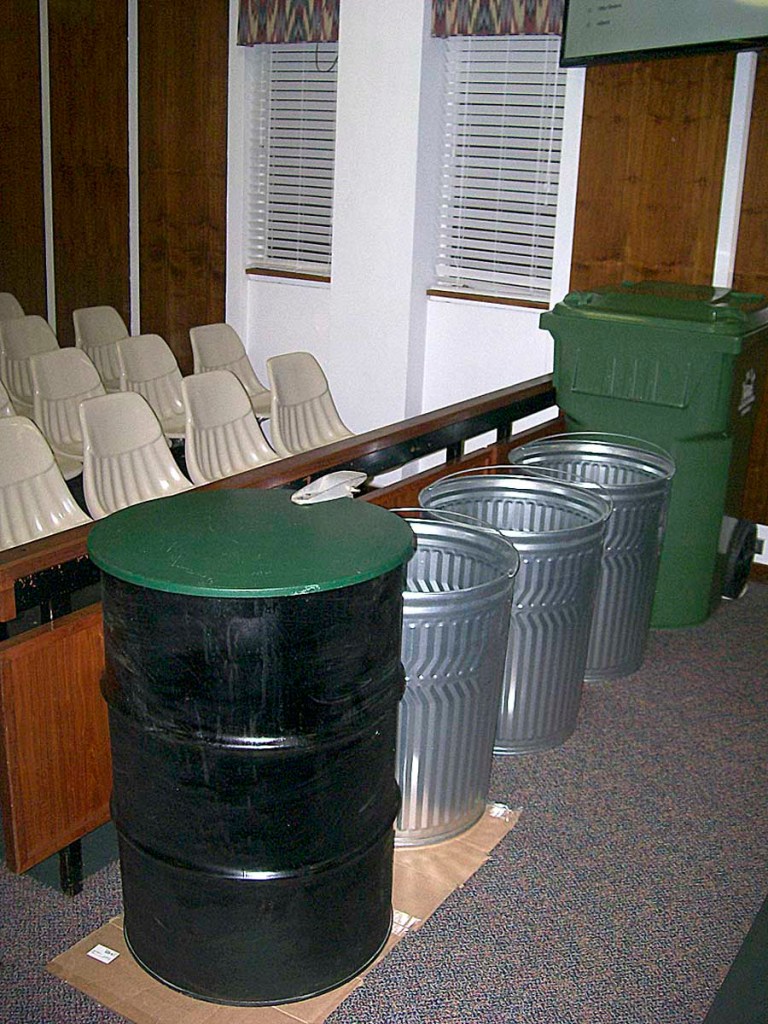City hears proposal for roll-out garbage containers
Published 10:51 pm Wednesday, February 19, 2014

- The Moultrie City Council is considering a proposal to replace an in-ground garbage collection system — including the liner in foreground and a pail, center — with a roll-out container, background.
An idea rejected in 2009 after a public outcry returned to the surface Tuesday during a presentation to the Moultrie City Council.
City Public Works Director Danny Ward presented a study that showed the economic advantages of roll-out garbage containers over the in-ground system that’s been in use for years.
Under the current system, each residence has one or two (or occasionaly more) in-ground liners that each hold a 32-gallon garbage pail. Twice a week, a city garbage truck comes to the house, a worker removes the garbage from the pail and dumps it in the truck.
Under the proposal, the city would provide each residence with a plastic, roll-out type garbage can that can hold 96 gallons of garbage. The resident would have to roll it to the curb, where the garbage truck could come by and collect the garbage with minimal human labor. Because the roll-out container is so much larger than the pail, collection would only be needed once a week.
The plan is almost identical to one Ward proposed in late 2008, but city council rejected it in February 2009 in favor of a rate increase after several residents, including former city councilman Carlton Duggan, spoke out against it.
On Tuesday, Ward said the roll-out system would save $700,000 over the first 10 years. The savings would mostly be from reduced labor costs.
To meet the twice-weekly pick-up schedule, the city must operate two garbage trucks, each with a three-person crew. The driver is a full-time city employee, and the two collectors are temporary workers. If the city could go to a once-a-week collection, it would need only one such crew.
In addition, Ward’s proposal calls for the city to purchase — in the third year of the project, if possible — an automatic garbage truck that would require no collectors at all. He showed a video of such a truck in another city. The driver stops it beside a roll-out cart that’s alongside the street, and from inside the cab he can operate a collector arm that grips the cart, lifts it and dumps its contents into the truck, then sets it back down.
“You can do this with one full-time employee instead of six,” Ward said; he later clarified that four of those six are temporary employees.
The elimination of the temporary worker positions would save the city their salaries, but it would also save an increase in health insurance costs that will be required by the Affordable Care Act. That increase is expected to be between $2 and $5 per hour, depending on which projection you believe, Ward said.
The proposed system would also save money on workman’s compensation claims. Ward said the current system leaves collectors open to leg injuries from stepping off the truck and to back injuries from lifting the heavy pails. He said the trucks also operate in traffic and collectors are in some danger of being hit by a car, although that’s never happened here, he said.
Ward did not offer an estimate of the start-up costs, but each roll-out cart costs $60 and the city would have to provide for 4,100 customers; some would require a second cart because of the amount of garbage they produce. In addition, “flippers” would have to be added to two existing garbage trucks to allow the collectors to dump the roll-out containers. Pickups would be reduced to once a week, so one crew would be eliminated; savings on their salaries would offset some of the start-up costs.
During the first and second years of the proposal, the existing liner maintenance crew — two temporary employees — would remove existing liners and fill in the holes. After all the in-ground liners were removed, that crew would be disbanded.
In the third year, Ward’s proposal calls for the purchase of an automatic garbage truck and the elimination of the last two collector positions.
Ward promised that no full-time city employee would lose his job. Virtually all the labor savings come from not hiring temporary workers for collectors positions. The driver of the crew that would be eliminated would be transferred to other duties, he said.
In addition to reduced labor costs, the roll-out carts would also last longer than the existing system. Ward said the carts are warrantied for 10 years, and of the few the city currently employs, some have been in use 16 years. By contrast the metal pails have a life-expectancy of about two years, he said. The liners last longer, of course, but they’re susceptible to vehicle and lawnmower damage and replacing them is very expensive.
When replacement parts are needed, they must be custom-made, Ward said, because Moultrie is the only city he knows of in the Southeastern United States that still has an in-ground system.
“There’s a reason most of the world has gone to this roll-out system,” he said.





